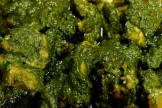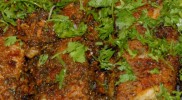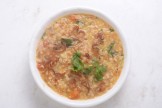
This dish doesn't have a gravy and threrefore should be served with naan and not over ri...
Dry prawns and ridge gourd curry is a tasty recipe. It is a very famous south Indian dish...

South Indian non vegeterain recipe is never complete without a masala fish fry....
Cajun Spice rub Chicken wing is one of the best combinations of flavors that one must tas...

Moong dal shorba is an excellent light meal to have with loaf of bread or can just even h...
Chicken tempura is really popular on Iftar table these days and served with sauce. ...
Poha is made from paddy and is a very popular product throughout the country.
|
About Recipe
|
|||||||||||||||||||||||||||||||||||||||||||||||
|
|||||||||||||||||||||||||||||||||||||||||||||||

rahul matharu Posted on Sat Apr 21 2012
Thanks just going to try this for breakfast..from a bachelor
Reply 0 - Replies
Jahnavi Lakkireddy Posted on Mon May 14 2012
Can we use the thin poha to make this upma?
Reply 0 - Replies



Pingali Sivasehubabu Posted on Sun Sep 16 2012
INDIAN POOR MAN'S RICH AND TASTY FOOD.?
Reply 0 - Replies

shehla nasar Posted on Thu Oct 11 2012
when i washed poha it got sticky and mashed .plz tell me why yours is separated.
Reply 0 - Replies


 Easy recipes
Easy recipes
 Healthy Recipes
Healthy Recipes
 Dessert Recipes
Dessert Recipes
 Mutton and Lamb
Mutton and Lamb  Indian Bread Recipes
Indian Bread Recipes
 Dal Recipes
Dal Recipes
 Chutney and Pickles
Chutney and Pickles  Indo-Chinese Recipes
Indo-Chinese Recipes
 Snacks and Appetizers
Snacks and Appetizers
 Low Fat Recipes
Low Fat Recipes
 Chaat Recipes
Chaat Recipes
 Biryani and Rice
Biryani and Rice  Curry Recipes
Curry Recipes
 Indian Sweet Recipes
Indian Sweet Recipes
 Egg Recipes
Egg Recipes
 Paneer Recipes
Paneer Recipes
 Chicken Recipes
Chicken Recipes
 Indian tiffins
Indian tiffins
 Egg less Recipes
Egg less Recipes
 Soups and Salads
Soups and Salads
 Indian Sea Food
Indian Sea Food
 Manchurian Recipes
Manchurian Recipes
 Indian Drinks Recipes
Indian Drinks Recipes
 Dinner Recipes
Dinner Recipes
desi97244 Posted on Sat Apr 07 2012
Great explanation & enthusiasm. When do you add the salt?
Reply 0 - Replies